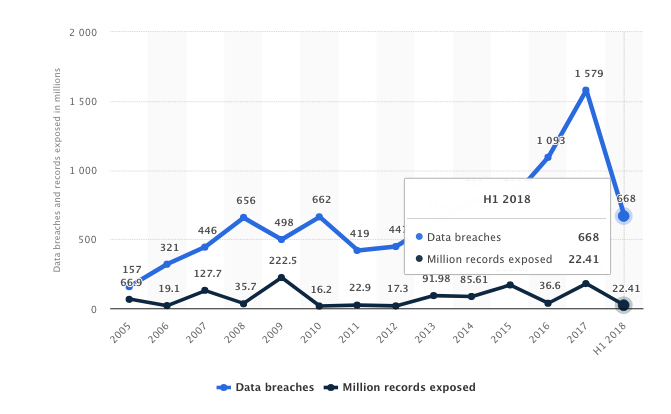Data storage security has become a top priority for businesses, both large and small. Data breaches and sensitive material exposure is reason enough to take data storage security seriously. In fact, in the first quarter of 2018, there were 668 data breaches with over 22 million records exposed.

Business growth, government crackdowns, and cost are also part of the equation. And knowing if your business is vulnerable when it comes to data storage security is critical. Let’s take a deeper look at data storage security, the associated risk, and how you can take some preventive measures.
Why Data Storage Security is Important
There are a number of trends affecting data storage security business decisions. For instance, the ever-increasing growth of data needing to be stored year over year. The IDC stated that the data stored on computers doubles every two years. That is a lot of data. And the more data stored increases risk for cyber-attacks. You also want to ensure you can scale your data storage needs. This can be done using a data storage calculator to get a clear picture of what your business needs are when it comes to data.
Other reasons data storage security is important:
- Increase in cyber-attacks. According to a data breach study by Verizon, there were over 50,000 security threats recorded in 2018 with over 2,200 data breaches. Cyber-attacks are a growing concern for businesses, and having a clear and concise data storage security plan is critical.
- Stricter government regulations for businesses. Due to the increased risk for cyber-attacks, governments are cracking down on businesses in order to protect people’s’ personal information online. This is evident in the recent GDPR regulations set by the EU.
- Data breaches are costly. If your business is a victim of a cyber-attack and a data breach happens, you may need to pay a lot of money to recover. In fact, the cost of a data breach for businesses is on average $3.6 million. That is 3.6 million good reasons to make data storage security a top priority.
Where is Your Business Vulnerable?
Data storage security is not only about finding a data storage security provider. It is also about identifying vulnerabilities in your current processes for keeping and securing data. One major area of vulnerability is lack of encryption on your part. To ensure you have top notch encryption in place, you’ll need to implement encryption technology or software.
Another way your business can become more vulnerable to a cyber-attack is not deleting data correctly. For example, if you delete data from your hard drive or other storage device, you can still have trace data behind vulnerable to anyone getting the information. To protect against this, delete data and have the storage area or device overwritten.
Lastly, business owners need to look at the physical security aspect. How secure are your business’ storage devices? You must take all physical security precautions, like limiting access to data storage by employee, or even office cleaning personnel. Think about how you can beef up physical security and take action.
Ways to Make Data Storage Security a Priority
The real first step is to put data storage security policies into place, like having an SOP for instance. These written policies can set forth levels of security for data, who has access, and how people can go about getting access in the most secure and vetted way. Security policies will also outline protocols for security measures and what to do if a security issue arises.
Other data storage security measures to integrate into your business include:
- Set up role-based control. Role based control is a security measure that ensures data is secure and accessible by only the right people. This also includes setting up admins, multi-factor authentication, and password protection.
- Encryption plays a big part. All data you have for your business needs to be encrypted. It should be encrypted in storage systems, as well as while moving from office to office. Encryption is critical.
- Have strong backup recovery processes. Having a backup and recovery plan can help your business mitigate loss after a security threat or cyber-attack, like ransomware or malware. Have backups scheduled regularly to keep data storage security a priority.
In Conclusion
There are a number of driving factors behind data storage security. It is vital for businesses to keep data safe and recoverable if a data security issue arises. The above vulnerabilities and ways to keep business data safe are not the end-all, but certainly important. Do you have any data storage security tips and tricks? We want to hear from you.
Leave a Reply